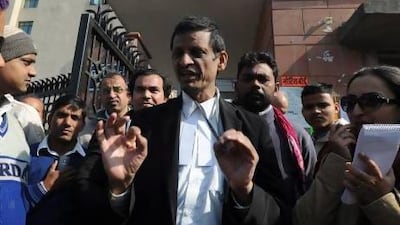NEW DELHI // Sitting under a tree on the lawn of the supreme court complex, Manohar Lal Sharma looks harried.
A mobile phone, hanging on a strap from his neck and nestling in the inner pocket of his black jacket, rings every five minutes. "Ever since I stuck my leg into this case, all my other work has stopped completely," he said with a wry smile.
"This case" is the trial of five men accused of the rape and murder of a 23-year-old student, a crime that has shocked and outraged India.
Mr Sharma angered many last week when he said he had never heard of a "respected lady" being raped in India. He also said the male companion of the murdered student was "wholly responsible" for the incident because the unmarried couple should not have been on the streets at night.
Mr Sharma, who took the case pro bono, is the most prominent of the defence lawyers representing a suspect. His readiness to defend the five accused men drew fire from other lawyers and from an angry public. He claims he has faced threats and that he was beaten by people and lawyers in a courtroom during preliminary proceedings a week ago.
Rajpal Kasana, president of the Saket Bar Association, denied this.
Mr Kasana admitted however, that the Saket Bar Association was opposed to the men's having any representation. But on the advice of the Bar Council of India, he said, his colleagues revised this view.
Originally Mr Sharma was to defend three of the men charged, but now is representing one, Mukesh Singh, who is 26 years old according to the police, and 22 according to Mr Sharma. Mr Singh is innocent, Mr Sharma insisted despite having only spent 15 minutes with his client. "They won't let me have any more time with him," he said.
Mr Sharma, 56, is lean with a slight moustache and a smattering of a beard on his chin. He grows out a little tuft of hair on the back of his head, indicating he belongs to the Brahmin caste, considered the highest of India's four castes.
He has been fighting cases in the supreme court since 1990. He also practised in Mumbai, working in corporate and financial law.
"My specialisation is simply this: If you have no way [out] in your legal matter, you come to me and I'll solve it," Mr Sharma said. "I'm not joking. This is what I do."
He cites a couple of cases from more than a decade ago in which he has rescued his clients from dire straits. More recently, in an appeals court, he said he convinced a judge to reduce the sentence of a head constable in Gujarat who had been convicted of murder in front of 19 witnesses. "I pleaded that he was under the influence of alcohol at the time and his sentence was reduced," he says. "And since he had already served five years in prison, he walked free."
But Mr Sharma has also had his public interest litigation dismissed by the supreme court as "frivolous". Last year, Mr Sharma petitioned the supreme court to order an inquiry into the conduct of the then finance minister, Pranab Mukherjee, for campaigning for president even before resigning his official post. A two-judge bench described Mr Sharma's petition as "fantastic and unacceptable" and warned him that the court "is not a theatre for your farcical play".
On another occasion, a two-judge bench fined Mr Sharma 50,000 rupees (Dh3,354) for filing a "frivolous" and "irresponsible" petition against India's chief justice.
His client in the gang-rape case is unemployed, a fifth-grade dropout. He is also the brother of Ram Singh, the driver of the bus on which the attack occurred.
Last month, on the weekend of the crime, Mr Sharma's client had come to Delhi to ask his brother to return to their village of Karoli in Rajasthan. Mukesh Singh was arrested days later. He is now being held in Delhi's Tihar prison and Mr Sharma claimed that the police tortured his client. "In the testimony the victim's friend gave to the police, he remembered the name as 'either Mukesh or Ramesh'. So why have they arrested a Mukesh? What happened to Ramesh?" Mr Sharma asked.
But Mr Sharma appeared confident about his prospects in this case. "Right now, the whole world is crying out to take revenge on these men in the name of justice," he said. "I want to prove that they can get a fair trial. I want to prove that there is a judicial system in India."
Follow
The National
on
& Samanth Subramanian on
Follow
The National
on
& Surya Bhattacharya on

